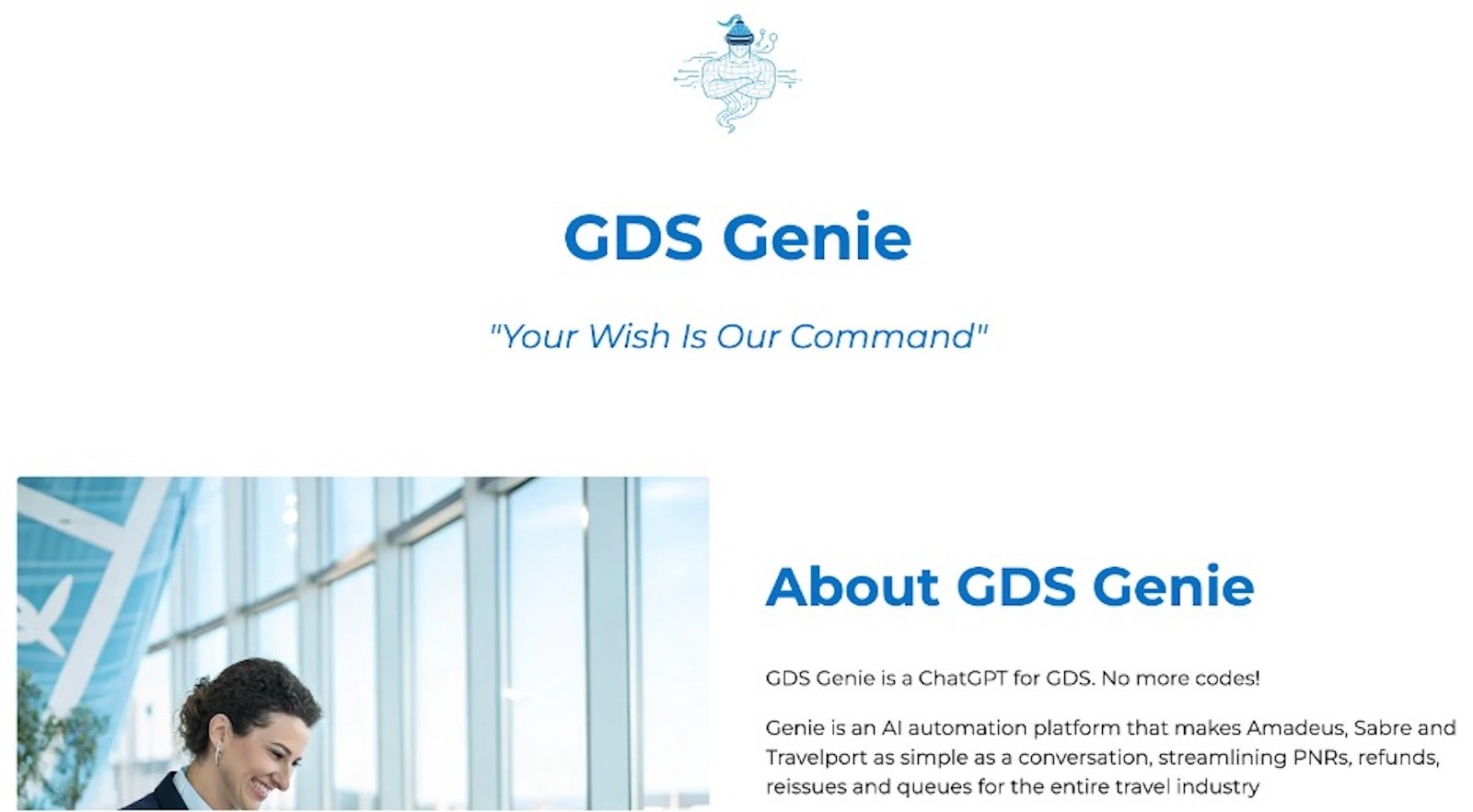Meet Neil Robinson, CEO and Founder of GDS Genie. You’re going to be hearing about him and his company a lot more often.
For decades the Global Distribution System (GDS) has been about as indispensable as it has been infamous. Developed in the 1960s and still powering everything from airline tickets to hotel rooms, the GDS is the unglamorous backbone of modern travel.
Advisors know it as both a blessing and a beast: essential, but technologically arcane. In total it has somewhere between 20 to 25,000 different commands, and advisors need to memorize at least 100 to become even moderately proficient.
For veterans it’s the way things have always been done, but learning the software has met friction among younger advisors who have different perspectives and expectations of technology in 2025. It’s a system that feels like a foreign language, because it effectively is (a coding one anyway).
Enter: Neil Robinson. His answer to that problem is GDS Genie, a tool he describes as “ChatGPT for the GDS.” Genie allows advisors to talk to Amadeus, Sabre, Travelport, Galileo or any other platform in plain English, whether it’s typed, texted, uploaded, or spoken.
Type “book me three adults, two kids, London to Dubai next Saturday” and within seconds the reservation appears. Ask it anything from reissuing tickets to swapping seats and it delivers all without a single cryptic keystroke:
“I had a light bulb moment when I realized I couldn’t remember the commands anymore,” Robinson told Luxury Travel Advisor. “We’re in 2025 and I couldn’t move a seat from 1A to 2D without Googling the code. That’s when I knew: Someone has to build this, and if I don’t, someone else will.”
When Lightning Strikes
Robinson’s path to this point has been anything but linear. Originally from the UK, he started in the military, detoured through finance and recruitment, and entered travel at Flight Centre Travel Group in 2010. He built and sold his own IC business, ran Colletts Travel during the pandemic, and then relocated to Dubai just last year.
It was there while setting up operations for Usturiun Luxury Travel that he stumbled back into the GDS quagmire and resolved to fix it.
AI is good at analyzing and processing large swaths of data. So what’s the largest, living set of data in the travel industry?
The GDS.
As the proverbial light bulb ignited, Robinson knew he was onto something big and began working with people whose backgrounds included companies like Microsoft and Google. The synergy and vision was obvious from the get-go: His experience in travel would shape what the AI should do, and their technological expertise would implement the vision.
And that was merely a few weeks ago.
When asked what sort of technical obstacles he’s faced with development, his answer was surprising.
“None,” he said matter-of-factly. “We’re working with some of the top AI and technical experts in the world, so when we decide something needs to be a certain way, it gets done.”

(Usturiun Luxury Travel)
Last week Robinson posted on LinkedIn about GDS Genie and within days had secured ten demos and a discovery contract with a major agency.
“We’ve had interest across verticals — luxury, corporate, even entertainment,” he said. “We’ve had an amazing response, and had nine demos in the first week.”
The speed is partly explained by his partnership model. Rather than bootstrap the build, Robinson struck a 50/50 joint venture with Jigar Panchal of IndiaNIC Infotech Limited, a tech firm with a robust team of developers and deep travel experience, including work for some of the top U.S.-based airlines as well as Travel Leaders Network. They fund development, he provides the vision and industry knowledge, and together they’re scaling at a breakneck pace.
Under the Hood
GDS Genie is essentially a layer of automation that sits on top of any GDS. Advisors can chat, paste, or speak instructions, and the AI translates those into commands which are executed in seconds.
When asked what task would make an advisor’s jaw drop Robinson replied, “An around-the-world itinerary, which might take 45 minutes to build, now takes about nine seconds. A simple London-Paris booking takes about five. Imagine a booking where you don’t have to click anything.”
More importantly, GDS Genie learns. It remembers that a client prefers vegan meals or aisle seats and even prompts advisors when they forget.
It also runs in the background, constantly checking for lower fares. If it finds one, it alerts the advisor: Cancel and reissue, then either pass the savings on to the client, or pocket the difference.
“That’s never been automated before,” Robinson said. “Now it is.”
For an industry anxious about the security of its data, Robinson is quick to underscore the programs guardrails.
“All client data stays in the GDS,” he explained. “We don’t touch it. The history of conversations sits in the agency’s own cloud, not ours. We hold zero liability.”
The company’s unique pricing is as simple as it is audacious: a flat $7,500 discovery fee, whether you’re a boutique agency with ten employees or a global network with hundreds of ICs. The two-month discovery period covers mapping APIs, testing edge cases, and stress-testing absurd itineraries.
“It’s value for money,” Robinson insisted. “Ten developers, six days a week. The goal is to deliver a go-live configuration that’s bulletproof from day one.”
Integrations with CRMs are on the roadmap, but they’re not currently a priority. What does take center stage at the moment is an “executive dashboard” that allows managers and multi-brand groups to prompt the system for reports in plain language.
“If you enter into the chat, ‘Please tell me how many American Airlines tickets we booked last week,’ Bang, it comes up. Instead of going through all the filters and reports, it does it instantly,” Robinson said.
But what if something goes wrong on a trip? Even if advisors use AI to make bookings more efficiently, won’t clients need human assistance?
“Think about it this way,” he offers. “If you hit a traffic jam in Google Maps, the program reroutes you. The logic for GDS Genie is the same if alternative arrangements need to be made.”
It begs the question whether AI like this spells the end of human advisors, but Robinson doesn’t flinch.
“In ten years, perhaps large corporate agencies may not need advisors,” he admitted, “but in the IC model where relationships are everything, AI will be a co-pilot. It’ll cover businesses while their owners are on holiday. It’ll save time, reduce errors, and let advisors focus on their relationships with clients. I take a human-first perspective because advisors that do good work will continue to do good work.”
Still, the trajectory is clear. Within a year, Robinson forecasts that GDS Genie will be able to handle an advisor’s inbox and bookings autonomously, mimicking their tone and preferences. Within two years, he wants to take it B2C that lets consumers book directly through conversational AI.
Whether that empowers advisors or leapfrogs them remains to be seen, but in a sense it doesn’t matter. This is the kind of innovation in AI that the entire industry has been anticipating, and it will no doubt reshape the way business is done.
Robinson acknowledges the tension but insists the near-term priority is arming the trade with better tools.
“What does 2025 technology look like? It should be frictionless. That’s the point,” he said. “GDS Genie is how we bring this technology into the 21st century.”
To learn more about GDS Genie, visit their website.
Jacques Ledbetter is a Luxury Travel Advisor contributor and founder of The Luxe Ledger newsletter. Join the conversation when this story posts there tomorrow on LinkedIn.





